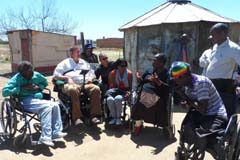JICA-RI Research Assistant Kengo Igei Gives Presentation about Multidimensional Poverty of Persons with Disabilities in South Africa at Academic Conference
2016.03.04
JICA Research Institute Research Assistant Kengo Igei presented the results of his research, "Multidimensional Poverty of Persons with Disabilities in South Africa: Comparative Analysis Using Large-scale Data," at the international symposium "Disability and the SDGs: Forming Alliances and Building Evidence for the 2030 Agenda." The symposium, sponsored by the International Centre for Evidence in Disability (ICED), was held in London, England on February 18-19, 2016.
A research institution established in 2010, ICED was launched by the London School of Hygiene and Tropical Medicine. The primary agenda of the symposium was how to build evidence aimed at dealing with disability issues pertaining to sustainable development goals (SDGs).
Presentations were given on a variety of topics such as initiatives and practices being undertaken by the World Health Organization (WHO), the UK's Department for International Development (DFID) and international NGOs, as well as on surveys measuring disabilities related to inclusive development for persons with disabilities. Workshops covered 11 themes, including access to health and rehabilitation, poverty, and disability measurement of children. Igei presented at the workshop focused on poverty.

The target population of Igei's study is persons with disabilities
Igei started his research on South Africa in November 2015. The data used for his empirical analysis was a 10 percent sample of the population census conducted in 2011, providing him with information pertaining to approximately 4.5 million individuals comprising roughly 1.2 million households. In order to control compounding factors other than impairments, he matched persons with disabilities against those without disabilities who shared the same personal characteristics such as age, gender, race and residence (city), and compared them in terms of education, employment, income and standard of living. Furthermore, he also conducted the same analysis for sub-groups divided according to the type of disability, such as hearing related or sight related, and as to whether or not they had multiple disabilities.
In his presentation Igei reported the preliminary results of his research, which were: 1) compared with persons without disabilities, those with disabilities in South Africa were generally more disadvantaged in education, employment, income and standard of living, 2) disparities between persons with disabilities and those without were different according to the type of disability, with the disparity being particularly large for those with difficulties in communication, remembering, walking, and with multiple difficulties, 3) comparing the poverty situation among persons with disabilities by race, black Africans with disabilities were found to be the most deprived in terms of multidimensional poverty.
Symposium participants showed a strong interest in the presentation, there was also feedback suggesting further comparisons according to age and type of residence (urban /rural) be carried out. Regarding the workshop as a whole, participants discussed various issues such as the fact that the theoretical mechanism showing disabilities influence poverty was still unclear, and that there was a need to continue to accumulate empirical research. Furthermore, in order for analytical results to be used for policy or put into practice, a view was expressed that they needed to be presented in an easier-to-understand format.
Igei's research results will be published as a JICA-RI Working Paper.

事業事前評価表(地球規模課題対応国際科学技術協力(SATREPS)).国際協力機構 地球環境部 . 防災第一チーム. 1.案件名.国 名: フィリピン共和国.

事業事前評価表(地球規模課題対応国際科学技術協力(SATREPS)).国際協力機構 地球環境部 . 防災第一チーム. 1.案件名.国 名: フィリピン共和国.

事業事前評価表(地球規模課題対応国際科学技術協力(SATREPS)).国際協力機構 地球環境部 . 防災第一チーム. 1.案件名.国 名: フィリピン共和国.

事業事前評価表(地球規模課題対応国際科学技術協力(SATREPS)).国際協力機構 地球環境部 . 防災第一チーム. 1.案件名.国 名: フィリピン共和国.

事業事前評価表(地球規模課題対応国際科学技術協力(SATREPS)).国際協力機構 地球環境部 . 防災第一チーム. 1.案件名.国 名: フィリピン共和国.
scroll